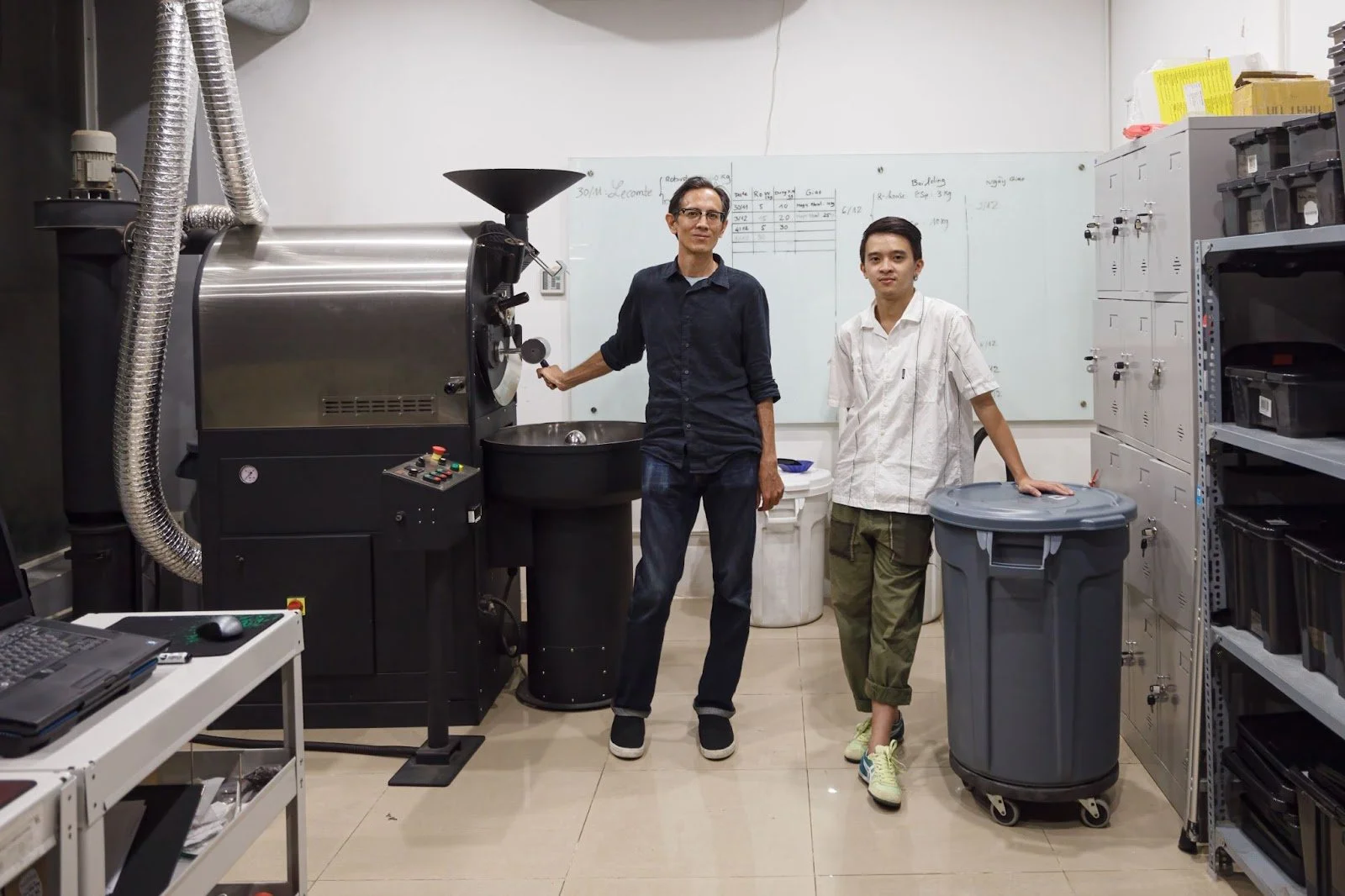+ What do you do?
I'm a coffee professional. I'm most comfortable as a technician, taking things apart and putting them back together, and that goes for abstract things like ideas, in addition to coffee roasters and blend profiles. I'm a Coffee Coach - that means I work with people and companies to achieve coffee business goals. Often this takes the shape of an ongoing Q&A session, but it can also be sending bar buildout plans back and forth, reviewing business plans, creating a green coffee buying strategy, or helping create in-house trainings.
I'm also the owner of Building Coffee, a coffee roasting company, and BEL, a specialty cafe, in Ho Chi Minh City, Vietnam.
+ What's Building Coffee?
In the past we were a sort of incubator / co-working space for coffee startups. We believe in healthy competition, and one of our goals was to mentor and facilitate better coffee roasting in Saigon. And it worked! A lot of really great brands got their start with us.
In 2021 we started transitioning away from that business model (we still have co-roasting customers) and toward a wholesale roasting model. We will continue to consult, but our bigger goal these days is to become a roaster of note in the region. You can buy our coffee at building.coffee
+ Where can I buy Building Coffee in the USA / Europe / Australia / elsewhere?
For wholesale roasted coffee in the USA, you can either contact me directly or submit an inquiry here. Small orders to the USA, Europe and Australia can also be accommodated and usually take 5-10 business days and cost about $9 USD per kilogram. Just get in touch to chat about what you're looking for.
+ Are you Vietnamese?
I do not identify as Hyphenated-American. I identify as mixed race, or, an American of Vietnamese descent. My mother was born in Sóc Trăng in the Mekong Delta, and my father is from Arkansas, in the southern United States. They met when my father was a helicopter pilot with the American Army. I was born in Arkansas and grew up in Texas. I am not fluent in Vietnamese. Culturally, as well as racially, I am a bit of a hybrid. I feel at home in Saigon, but also in Texas and the Pacific Northwest. I understand the impulse to label people like me, because I am not white. **Please consider the complexity of race, immigration, migration, and culture when asking people of color to self-identify. **
+ Why do you live and work in Vietnam?
I'm interested in what's happening here on a personal and a professional level. I came to Vietnam in 2004 to meet my Vietnamese grandparents for the first time. Since then I've come and gone several times, buried both of my grandparents, and been amazed at how quickly Saigon in particular changes and grows. I think it is an exciting place to be and watch right now, and I'm interested in helping smallholder coffee farmers become small businesses. I think there's immense potential for Vietnam to be an exporter of high quality arabica; I also believe in the potential of robusta as a completely unique product that isn't only compared to arabica. I acknowledge that it will take many years for this to happen, and that I will likely be on this mission for the rest of my career.
+ I'm coming to Ho Chi Minh City (Saigon). Where can I find good Specialty coffee?
There's so much happening in Saigon, it's hard to keep up.
For now I can confidently recommend
- BEL - 40/8 Pham Viet Chanh, Binh Thanh District (this is my cafe)
- [a] coffeehouse - 15 Huynh Khuong Ninh, District I
- Bosgaurus Coffee Roasters - Saigon Pearl, Binh Thanh District
- Saigon Coffee Roastery - 232 Vo Thi Sau, District 3
- Every Half Coffee Roaster - 232/23A Vo Thi Sau, District 3
+ I thought Vietnam only grew robusta. Is the arabica any good?
Yep, and that's why I focus on Vietnam — to figure out where it's coming from, and help improve both access to market for growers and the quality of the coffee itself. Recently, a few Dalat-area arabicas scored consistently in the 84-87 point range according to one specialty importer.
+ Where can I buy local green arabica coffee in Vietnam?
Depending on the volume you wish to buy, this answer can vary. For hobby roasters/enthusiasts, ask any of the specialty roasters in town if you can buy from their supply. The local quality coffee scene has changed and improved a lot recently, so it's much easier to find a nice variety of options. Look up Zanya, D&D Kaffee, Culture Bean, Lang Biang Coffee Village, Valleys Coffee, Amber Specialty Coffee, Future Farm, Vuong Farm, or Puro. These suppliers can recommend other suppliers as well. It's a small community, and many folks are happy to share contacts.
+ Where can I buy imported green arabica in Vietnam?
Depending on the volume you wish to buy, this answer can vary. For hobby roasters/enthusiasts, ask any of the specialty roasters in town if you can buy from their supply. Get in touch with Comco Trading in District 1 (five kg minimum), Amber Specialty Coffee, AMA Specialty Coffee, and Bero/Neumann for larger quantities.
+ I want to visit a coffee farm in Dalat. Where should I go?
La Viet Specialty Coffee in Dalat and K'Ho Coffee in Lac Duong. (Both have Facebook pages for connecting). If you're not looking for specialty farmers and just want to see what's up with Dalat in terms of coffee farming, there are tour companies that offer farm visits.
+ What's the deal with weasel / civet / kopi luak coffee? Is it specialty? Can you tell me where to buy it?
First of all, no, I can't tell you where to buy it. It is not specialty coffee, but rather a speciality of Southeast Asia. There is no qualitative value added to the coffee bean, and it is exploitative and cruel to animals. What began as a genuine tactic for isolating very high quality coffees has become an artificially inflated niche market for people who are suckered into gimmicks.
Once upon a time in Indonesia, civet cats, a type of weasel indigenous to coffee-growing areas, ate coffee cherries as part of their diverse diets. They chose the tastiest (ripest) cherries, and the enzymes in their guts began the fermentation process of the coffee seed. Therefore, their droppings (aka shit) contained a partially processed coffee bean. This was then cleaned, dried, and roasted. The current model doesn't take advantage of any of these factors because:
the animals are kept in cages, and are not freely roaming coffee farms choosing ripe cherries based on the taste
they are force-fed diets of pure, pre-picked cherries, thus eliminating the healthy gut conditions necessary for the proper fermentation processes to begin
the original farms where civet coffees came from were well-maintained, high-quality varieties. The farms that produce the coffee cherries civets are force-fed in cages are poorly maintained, usually growing commercial robusta and arabica, and very likely do not produce quality coffee to begin with. The shitty (literally) civet processing adds no value to already shitty coffee.
In short: there is no value or quality added in this process. At worst, it is incredibly cruel to these animals and at best it is pretty stupid.
+ I LOVE Vietnamese iced coffee (cà phê sữa đá) and I think it's the best in the world! Why don't you like it? Why mess with something perfect?
I want people to like what they like, period. If you enjoy Ca Phe Sua Da, rest assured that I don't want to change it! There's a market for everything. Typically it's cheap, sweetened & condensed milk added to poorly-roasted, low-quality, probably stale Vietnamese robusta coffee. Since robusta is typically mass-produced, as opposed to carefully selected and developed, it is roasted very darkly, and most of the coffee tastes like burnt rubber. It is also often combined with butter, chicken fat, fish sauce, salt, caramel and other mysterious additives. Maybe try some of the more delicate versions of the drink available in specialty cafes, rather than on the street (I like Vietnam Coffee Republic's the best right now). Or, try your Vietnamese street coffee black next time, without flavors or additives, and then talk to me about how perfect it is. And, hey, if you like it that way - great! You do you.
Developing a specialty market doesn't require changing or removing an existing market, in the same way that the craft beer movement didn't destroy the "regular beer" industry.
+ I heard that Vietnamese coffee served on the street is full of chemicals and additives. What are they? How do I know if the coffee I'm buying is "clean?"
The coffee sold on the street in Saigon is notoriously un-coffee-like. There have been newspaper stories every so often for the past few years exposing fake coffee producers, but it is still widely available on the streets of Saigon. A good rule of thumb: if your coffee costs less than a bottle of water, it's probably not coffee. As far as "clean" coffee goes, your best bet is to stick to those with traceable, transparent links to their producers. Some people think that coffee like this in Saigon is "too expensive," but I would urge people to wonder instead why the coffee on the street is so cheap.
+ Why aren't you Q Grader certified?
Though I look forward to taking the course and becoming certified someday, I don't think Q Grade Certification is a prerequesite, or even a requirement, to being a qualified quality control specialist. Nothing is the same as training, experience, and good mentorship.

